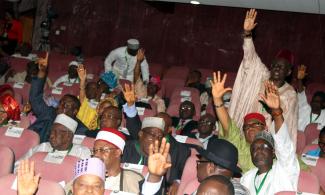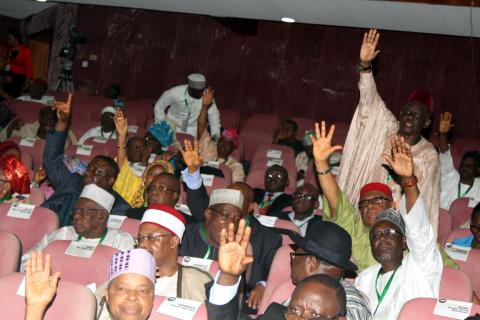
I gladly doff my hat to the delegates for the resoluteness to scrap the state electoral commissions, the provision of independent candidacy, and the withdrawal of government sponsorship of pilgrimages.
The National conference is winding down; and so far, it's really proved the pessimism of those dispassionate to its course wrong.
To me, who had of a truth reserved some mistrust over it, going majorly by the 'No go area' stance of the Federal government, it remained an affair to be viewed with mixed feelings.
I had felt that the conference should have been an avenue, where every section was provided with the chance to air their earnest views; and to which include the willingness or otherwise to remain in the corporate Nigeria.

Sadly, this enabling platform for open and untrammelled dialogue was defeated by this stifling imposition; a key subject and as a matter of fact, a major decider for processes of this kind, was missed out.
However, going by the conference proceedings, some hopes were ignited, which prevailed upon me not to throw away entirely the bath water with the baby. This is going by the salient deliberations in the course of the dialogue; and the resolutions reached therefrom.
In all, howbeit, the conference has been an up and down ride for me going by the roving recommendations. It's being one of hope-raising and that of a debilitating morale hamstring.
Hereunder, are some of the decisions that won my applause.
I gladly doff my hat to the delegates for the resoluteness to scrap the state electoral commissions, the provision of independent candidacy, and the withdrawal of government sponsorship of pilgrimages. Others are fiscal federalism, the creation of separate accountants-general for the federal government and the federation, reduced ministerial slot and the removal of immunities.
The list reels on to include the eradication of state of origin backlog and right to positions for residents save the traditional institutions reserved for indigenes, and the review of the allocation formula, among other issues.
Even as I give the delegates thumbs up for the many impressive decisions reached over some of the committees' recommendations, I felt a few failed from meeting my humble yet deep yearnings.
Foremost among these is the creation of more states. Instead of creating more political spaces with no prospects for economic viability to sustain them, as is the case with most of the present states, we should revert to the regional structure-now six.
The other is the retention of the two-chambers legislature. In alternative and to save cost of governance, I felt the unicameral style with preferably the House of Reps for inclusive representation was better. The retention of bicameralism negates the goal the cut-down in ministers seeks to achieve, and which was recommended.
The issue of resource control together with derivation percentage had remained very dicey since after the first republic; it had consistently been an issue of intense tiff and which unfortunately, the conference was unable to amicably resolve. This is one profound area the conference failed woefuly to nudge my appreciation. Thanks to the timidity of the Devolution C'ttee.
Instead of hitting the hammer on the head, they dribbled gibberishly over it without emitting the absolute will demanded of such c'ttee.
I had strongly advocated for resource control and would always do. This is basically because, aside from truly reflecting true federalism, which also the conference had adopted, it ensures that each section cherishes industry and self-reliance; makes for economic independence and reduces insolvency while still contributing their quota to the centre.
More so, I envisaged a situation where the local government system was scrapped for their unproductiveness; but alas, this was far from being reached at the confab. I had also expected the recognition of ethnic autonomy to end the cries of political marginalisation and domination; but it was not to be.
So far so good, the conference could only be described as having been successful only for providing the delegates with the leverage to express their views peacefully and in line with modern practice.
Nevertheless, though unfortunate, the conundrum that bedevilled the national sphere is far from being scratched; in so much as the delegates where subsumed to willy-nilly act in response to the suggested apparent unity for which all their resolutions streamed from.
For the fact that the 'National Question' of whether we are to live together and if yes, under what terms; a process which ought to be taken out of a free will, remains yawning, the foundation of that el Dorado we so desired is anything but laid.
Meanwhile, let's hope and pray for that moment when we can sit and carefully reconsider the terms and the possibility of our continuous co-existence; for then is the process for the now elusive national peace and commitment staged.
All the same, kudos to the federal government of President Jonathan for his courage and the nobility of intention in the dialogue-call, at least.
Ahanonu Kingsley, Owerri.